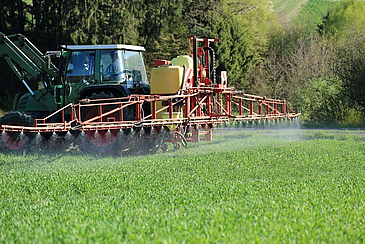An increasing number of studies show that chemical pesticides in their current use have harmful effects on ecosystems and biodiversity. The death of insects and the decline of birds in the agricultural landscape are a consequence of this. According to European Union regulations, however, the use of pesticides is not permitted to lead to a loss of biodiversity. In order to close this gap between legal intention and reality, scientists are proposing a revision of the approval procedure for pesticides as part of a current international study involving the University of Bremen, the University of Koblenz-Landau, RWTH Aachen University, ETH Zurich, and the Helmholtz Centre for Environmental Research in Leipzig. The European Food Safety Authority (EFSA) is the main authority required to do this.
Critical Examination of Testing Procedures
This is intended to close the gap between the current legal intention and reality. The study titled “Future pesticide risk assessment: narrowing the gap between intention and reality” has now been published in the journal Environmental Sciences Europe. The study formulates ideas on how to achieve prescribed environmental goals that have been missed so far and that serve to protect biodiversity. Professor Juliane Filser from the Center for Environmental Research and Sustainable Technologies at the University of Bremen has been researching the environmental risks of pesticides and other chemicals for many years. An essential part of her research is to critically examine the testing procedures required for the approval of a new substance and to make suggestions for improvements.
Real Environmental Situation Ignored So Far
Together with the expert group of the new study, she is now turning her attention to the approval procedure itself. The research team criticizes that the current procedure largely ignores the real environmental situation. “It makes a huge difference whether a pesticide is applied in a flat and windy or warm and hilly landscape,” says Filser, “or whether a product comes into the tank alone or – as is so often the case – together with others. Depending on the scenario, the active ingredients are transported different distances, degraded more or less quickly, and the organisms concerned can also be completely different.”
Temporary Approval
To take this into account, the scientists are proposing a number of measures. As a first step, stricter safety factors should be used in the approval procedure, i.e. the maximum permissible environmental concentration should be much lower than previously. In addition, the costs and benefits of new products should be taken into account in the approval process. It would also be necessary to examine whether there are already more environmentally friendly alternatives on the market. In the medium term, however, the current approval procedure needs to be replaced by a limited temporary approval to investigate the environmental impact in selected areas under real usage conditions. If this is combined with regular surveys of the fauna and flora, a decision can be made at the end of this period as to whether the approval can be extended or has to be withdrawn.
Defining Upper Limits
In the long term, the various regulations should be harmonized with regard to water protection, pesticide approval, and nature conservation. Regional management systems could be introduced and, for example, upper limits for the use of pesticides could be defined in spatial units.
The Study
The complete report “Future pesticide risk assessment: narrowing the gap between intention and reality” by Ralf B. Schäfer, Matthias Liess, Rolf Altenburger, Juliane Filser, Henner Hollert, Martina Roß-Nickoll, Andreas Schäffer, and Martin Scheringer is available on the Internet at enveurope.springeropen.com/articles/10.1186/s12302-019-0203-3. The study was published in the journal Environmental Sciences Europe on April 3, 2019.
Contact:
Professor Juliane Filser
University of Bremen
Faculty of Biology/Chemistry
Center for Environmental Research and Sustainable Technology (UFT)
Tel.: +49 421 218-63470
E-mail: filser@uni-bremen.de

